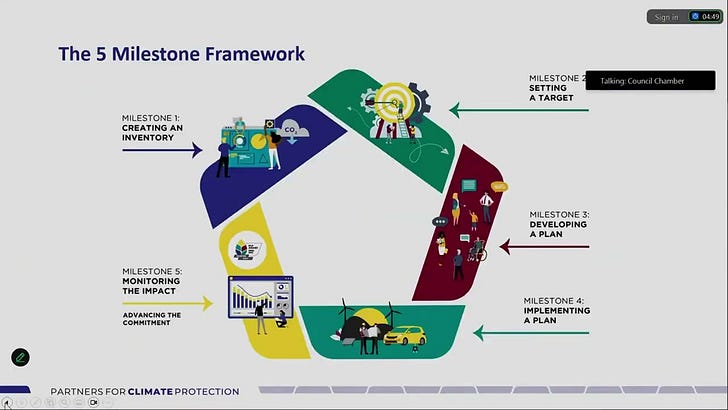Thorold Council Challenges Federation of Canadian Municipalities on Climate Program—A Historic First
Thorold Council Challenges Federation of Canadian Municipalities on Climate Program—A Historic First
On May 28, 2024, the Thorold, Ontario City Council made history as the first municipal council in Canada to thoroughly question representatives from the Federation of Canadian Municipalities (FCM) about the Partners for Climate Protection (PCP) Program—a program already adopted by over 500 municipalities across the country.
The meeting exposed glaring gaps in the program’s transparency, accountability, and scientific grounding, raising concerns that had apparently never been addressed before, despite widespread municipal participation.
The Presentation That Raised Eyebrows
Kiana Simmons, Project Officer, and Lindsay Telfer, Manager of Capacity Development at FCM’s Green Municipal Fund, presented an overview of the PCP Program. They described it as a voluntary, no-cost initiative designed to help municipalities create and implement local climate action plans.
Key claims made by the presenters included:
No Cost for Participation – Membership is free, though municipalities may face unquantified costs related to staff time and implementation.
No Prescriptive Actions – Municipalities are not required to follow specific policies but receive tools and resources to support self-identified priorities.
Recognition-Based Framework – Progress is acknowledged through a five-milestone process without direct funding support.
Despite this polished presentation, the FCM representatives were quickly challenged by councilors, revealing critical flaws in the program’s design and implementation.
Council Grills FCM Over Costs, Liability, and Science
1. Costs and Resource Demands – Who Pays?
Councilors repeatedly demanded cost estimates for completing the five milestones, including staff time and consultant fees. FCM dodged these questions, insisting participation was free while failing to acknowledge that staff time is a taxpayer expense.
Councilor DeRose emphasized the need to quantify expenditures, but FCM provided no data, relying instead on vague assurances that resources and templates would “lighten the burden.”
2. Liability Concerns – Shifting the Risk
Councilor Hanley highlighted a liability disclaimer on the PCP website, which absolves FCM, ICLEI Canada, and the federal government of any responsibility for the outcomes of municipal actions under the program.
When pressed, Telfer admitted the program leaves all responsibility and risk with municipalities, since priorities and implementation plans are determined locally.
This lack of accountability raised red flags about potential legal and financial vulnerabilities for municipalities adopting the framework.
3. Scientific Justification – Where’s the Data?
Questions about the scientific basis for the program, including its claims about reducing greenhouse gas emissions, were met with deflections.
Councilor DeRose asked FCM to quantify emissions reductions achieved by municipalities that completed the program. FCM admitted they had no consolidated data, even for municipalities that had reached all five milestones.
Councilor DeRose took issue with the climate science assumptions, pressing the presenters to explain the percentage of carbon dioxide produced by human activity versus natural sources. Simmons admitted this was outside her expertise, referring councilors to the Intergovernmental Panel on Climate Change (IPCC)—raising concerns about the program’s scientific rigor.
ICLEI Connections and Agenda 21 – A Hidden Agenda?
A recurring theme was the role of ICLEI Canada and its connections to Agenda 21, a United Nations sustainable development framework.
Councilor Hanley asked whether the PCP Program aligned with ICLEI’s Agenda 21 goals, particularly its emphasis on low-emission, circular, and nature-based development—concepts many critics associate with land-use restrictions and property rights concerns.
While the FCM representatives claimed they were separate from ICLEI and only collaborated for “technical expertise,” their responses failed to address concerns about the influence of international agendas on local decision-making.
This raised alarms about whether the program might ultimately promote top-down policies disguised as local initiatives.
A Program with No Clear Answers
Despite its 30-year history and adoption by over 520 municipalities, this meeting exposed the PCP Program’s lack of transparency and accountability.
Key unanswered questions include:
What are the real costs? – No estimates for staff time, consultant fees, or implementation costs were provided.
What are the results? – FCM could not quantify emissions reductions achieved by program participants.
Who is accountable? – Municipalities bear full legal and financial responsibility, while FCM and ICLEI disavow liability.
What’s the scientific basis? – Presenters failed to demonstrate basic knowledge of climate science, deflecting questions to external organizations like the IPCC.
Is there an agenda? – ICLEI’s ties to Agenda 21 raised questions about the global governance influence on local policies.
Thorold Council Breaks the Silence
The Thorold meeting revealed that no other municipality had questioned the program’s framework before adopting it. This raises concerns about whether other councils nationwide had blindly approved participation without fully understanding the costs, obligations, or long-term consequences.
Councilors emphasized the need for due diligence before making decisions that could affect taxpayers, property owners, and economic sustainability.
Key Takeaways for Municipalities
Demand Transparency – Insist on clear cost estimates, timelines, and measurable outcomes before adopting climate programs.
Assess Liability Risks – Ensure municipalities are protected from legal and financial fallout linked to program participation.
Question Science and Data – Avoid programs that rely on vague claims without verifiable results.
Guard Against Global Influence – Carefully scrutinize partnerships with international organizations like ICLEI to preserve local autonomy.
Prioritize Practical Solutions – Focus on pollution prevention, infrastructure improvements, and energy security instead of global carbon reduction targets.
Final Thoughts: Local Autonomy Over Global Agendas
Thorold’s historic stance sets an example for other councils to ask hard questions about programs impacting local governance. This case highlights the importance of transparency, accountability, and evidence-based policy-making to protect municipal sovereignty and taxpayer interests.
As municipalities across Canada face growing pressure to adopt climate action programs, Thorold’s approach underscores the need for vigilance and due diligence to avoid becoming entangled in global agendas disguised as local solutions.





It's great to have this latest summary, Maggie. Excellent work.